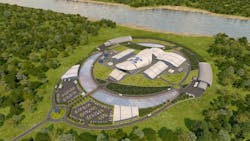Dual Feed: Microsoft Hunts for Hyperscale SMR Options; Google Forges PPAs in Ireland, North Carolina
"Dual Feed," an industry term reflecting data centers with more than one electrical feed or at least more than one substation, is the title of our new feature at DCF, where we periodically round up news updates and insights from the closely related spheres of utility-based and on-site data center power supply and generation, alongside issues related to data center renewable energy sources, providers, and power purchase agreements (PPAs).
Microsoft In Hunt for Hyperscale SMR Nuclear Options
As it becomes increasingly clear that many future data centers will not be able to rely on a power hookup from the utility grid, industry watchers have wondered when and whether a hyperscaler would roll out an Small Modular Reactor (SMR) strategy for onsite nuclear power generation. Providing a clue to that answer, on Sept. 25, Microsoft posted a job for a nuclear specialist to pursue a SMR strategy to support its data centers. Mainstream media outlets including CNBC, Business Insider, Axios and The Verge quickly jumped on the news.
The position for a "Principal Program Manager, Nuclear Technology" (for which applications are no longer being accepted, per the company's jobs board) is specified for multiple locations across the U.S., and calls for an individual contributor in technical program management "who will be responsible for maturing and implementing a global Small Modular Reactor...and microreactor energy strategy" for Microsoft.
The company added that this senior position will be tasked with leading the technical assessment for the integration of SMR and microreactors to power the data centers on which the Microsoft Cloud and AI platforms reside. Microsoft noted that the principal program manager "will maintain a clear and adaptable roadmap" for SMR nuclear technology’s integration, as they "diligently select and manage technology partners and solutions, and constantly evaluate the business implications of progress and implementation."
Microsoft added that its ideal candidate will have "experience in the energy industry and a deep understanding of nuclear technologies and regulatory affairs," and that the position-holder will also be "responsible for research and development of other pre-commercial energy technologies." Data Center Frontier has inquired with Microsoft regarding any expansion of details related to this news, on which we'll keep you posted.
As further noted by reporting on this topic in March by DCF's David Chernicoff, "In late 2023 the Nuclear Regulatory Commission (NRC) made the decision to allow small modular reactors to be located closer to higher population density areas, and in mid-January 2023 the NRC issued the final ruling on the NuScale Small Modular Reactor Design Certification." Chernicoff's reporting added that "the US Department of Energy is working with the Utah Associated Municipal Power Systems to get the first demonstration system in the US, a NuScale SMR, up and running at the Idaho National Lab, by 2029, with a full-scale grid system running by the following year."
Microsoft eyes 100% renewable energy PPAs for data center in Naas, Ireland
Notably, less than a week prior to its SMR nuclear job posting, local news reports revealed that Microsoft confirmed being at an early stage of developing plans for a data center campus in Naas, Ireland that will seek to employ 100% renewable energy. The Kildare Nationalist reported that "Microsoft has commenced initial pre-planning consultation with relevant authorities" for the proposed development, which will help to inform the evolution of the design process on a site specifically zoned for data center use. ("As project plans develop, Microsoft will embark on an ‘extensive’ engagement process with local residents, businesses and community groups," noted the report.)
As further reported by the news outlet, Microsoft wrote in a statement to the Kildare Nationalist on Sept. 20:
“It is our ambition that this project will be designed and developed in line with the six guiding principles included in the ‘Principles for Sustainable Data Centre Development’ set out by Government in its 2022 policy statement on the role of data centres in Ireland’s enterprise strategy.
It is Microsoft’s preferred solution to use 100% renewable energy as committed to in our recent announcement with [Ireland's] Government to enter into multi-year Corporate Power Purchase Agreements (CPPAs) with energy companies to create new renewable energy contracts, which will see Microsoft contribute close to 30% of Ireland’s corporate power purchase agreement target by 2030.”
Google enters PPAs in Ireland and North Carolina
Speaking of Ireland, as noted earlier this month by ReNews.biz, Irish solar energy producer Power Capital Renewable Energy (PCRE) has signed a power purchase agreement (PPA) with Google to provide clean electricity for the hyperscaler's data center and related offices in that country. The 14-year supply agreement reportedly covers part of the production from an 83 MW solar farm under construction in County Wexford. The report said PCRE will be responsible for providing Google with solar power production for a capacity of 58 MW for the duration of the PPA.
The deal will contribute to Google’s goal to match its operations with carbon-free energy on an hourly basis by adding renewable solar energy to the Irish electricity grid. The report said the project successfully secured project financing earlier this year from AIB and La Banque Postale, and is due for completion in early 2024. ReNews.biz added that Power Capital will invest about €54m to construct the site, which will connect into a 110kV substation that the firm is specifically building for the plant to connect into the transmission system, as operated by Eirgrid.
In terms of stateside PPAs for data center renewable energy, on Aug. 29 Apex Clean Energy and Google announced a PPA, the companies’ first, for the full 189 MW capacity of Apex's Timbermill Wind project, to be constructed in North Carolina. Timbermill Wind said that, in supporting Google’s stated 2030 commitment to powering its operations with carbon-free energy around the clock, the new PPA will contribute to the clean energy needs of the company’s data centers on the PJM grid.
“Timbermill Wind demonstrates the Apex team’s unmatched ability to execute on our expansive portfolio, even in a region notoriously difficult to advance wind power,” said Ken Young, CEO of Apex. “Alongside Google, with shared values and an ambitious perspective of its role in the energy transition, we’re pleased to deliver this best-in-class project—one only achievable through this strong collaboration.”
Google, in its third decade of climate action, notes it has matched its annual electricity consumption with 100 percent renewable energy since 2017.
“Within the decade we have an ambitious goal for every Google data center to operate on clean electricity, every hour of every day,” said Donna Calderon, energy senior lead at Google. “We’re excited to work with Apex for the first time to not only add wind power to one of the most difficult grids to decarbonize, but also bring additional clean energy jobs to North Carolina.”
Keep pace with the fast-moving world of data centers and cloud computing by connecting with Data Center Frontier on LinkedIn, following us on X/Twitter and Facebook, and signing up for our weekly newsletters using the form below.
About the Author
Matt Vincent
A B2B technology journalist and editor with more than two decades of experience, Matt Vincent is Editor in Chief of Data Center Frontier.


